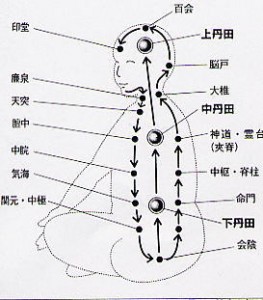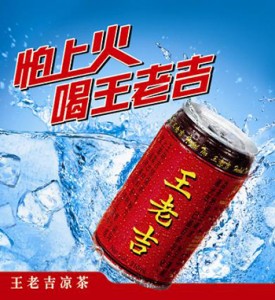“Chee” is one of those concepts that floats around in the English-speaking world, but is rarely understood outside of its cultural context. I’ve written about this before in Ginseng and Ginger posts. There are loads of potential benefits to your health if you consider Qi in your daily life. But, first we need to get an understanding of the meaning of the word “Qi” and then we can drape more layers of meaning on top of that. After all, language defines culture and allows it to breath, which is not too far away from the literal meaning of Qi.
气 [qì]
氣 (traditional character)

Meanings: Air, gas, breath, mood, smell, manner, anger, etc.
The more familiar of the two Qis (mmmm, cheese…) is something called “Qi Gong” 气功 – literally “air” + “results/success”,and known as “a system of deep breathing exercises,”[*] it is a form of meditation and has been used by martial artists and common people for hundreds of years. The image to the right shows the flow of Qi through the body, with the 3 “elixir fields.” These are basically places where energy is stored. The arrows show how energy flows point-to-point through the body, although it is not always in this direction.

Trivia time! Where is the center of the human body? When I was first asked this question I pointed to my naval/waist area. Where did you point? In fact, according to Qi Gong, the center of your body is at your upper lip. Yep, its in your face! This comes from the idea that energy is draped over your body from the top.
Combining body movements and breathing exercises are key to this practice and can have great health benefits, similar to Tai Ji or “Tie Chee”. Due to better blood circulation, relaxed breathing, and reduced stress, these exercises are used for health maintenance by millions of people around the world. As you can imagine, the field of Qi Gong is extremely deep and could take a lifetime to understand fully.

The other Qi which is more often used in daily language here in China, but has less literature written about it, is called Re Qi or “Ruh Chee” 热气 – literally “hot” + “air”, and is similar to the scientific idea of pH-levels. When clarifying this with Chinese friends, they disagree that it is related to the amount of Acid or Base in your body; however, there’s really no other way to understand this better in English.
An expression used to say whether you have “excessive internal heat” in your body is “Shung Hor” [Shang Huo] 上火, literally “increase” + “fire.” Food and drink can increase and decrease the heat in your body, which is a normal topic of discussion at any meal, formal or informal. This happens when you’ve eaten too much strong food, especially salty, fried, or BBQ food. Too much “internal heat” causes pimples or small red dots on the skin.

The opposite phenomenon is called “Sheea Hor” [Xia Huo] 下火, literally “decrease” + “fire.” Because the internal heat normally increases for most people, we need to actively drink or eat things that can decrease internal heat. Chinese herbal tea, without sugar, is a great option. The most popular sugary one in the Chinese world, called Wang Lao Ji, is actually as famous as Coca-Cola. Foods famous for reducing internal heat include: watermelon, bananas, bitter melon, cucumber, rice, green beans, wheat, toufu, celery, cabbage, and many more!